This vegan brown rice casserole with broccoli and beans couldn’t be any easier. Simply place the ingredients into a baking dish, cover them tightly, and bake—this is a quintessential “dump and bake” recipe! The casserole is full of wholesome nutrition, and it’s a great make-ahead recipe. A creamy topping of vegan cashew queso takes it to the next level.
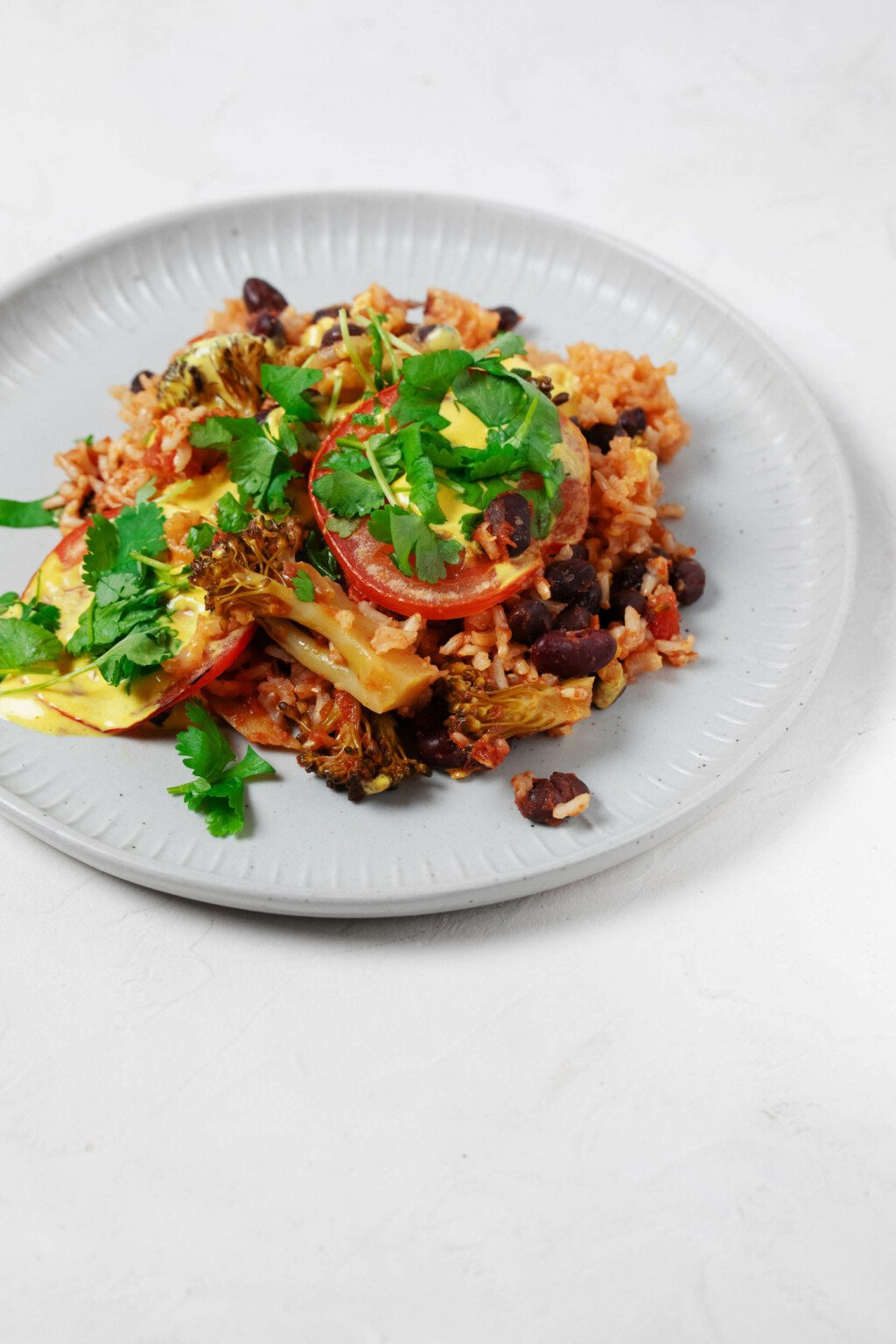
I’m calling this dish of baked brown rice and beans a casserole. But “casserole” may be a bit of an overstatement.
When I think “casserole,” I think about lasagna, enchiladas, gratin, or something equally involved.
This is really a “dump and bake” recipe—a meal that’s created by putting a bunch of ingredients into a casserole dish, covering them, and allowing the oven to do all of the work for you.
It couldn’t be easier. And, thanks to the wholesome building blocks of brown rice, black beans, and broccoli, the dish could hardly be more nutritious, either.
The beauty of baked brown rice
There probably isn’t a grain that gets more use in my kitchen than rice.
I routinely make all colors—brown, white, black/purple, red—and shapes: short grain, long grain, medium grain.
Rice is hearty, healthful, and versatile. It’s a source of B vitamins, folic acid, magnesium and potassium, and selenium. Brown rice is a decent source of dietary fiber.
Most of the time, I prepare rice by boiling it on the stovetop. This recipe, however, has reminded me of how stress-free and effective it is to bake rice instead.
Rice of all kinds can be baked by rinsing the grains, putting them into a casserole or square baking dish, adding liquid, covering tightly, and baking till the grains are fully cooked.
Typically, this takes a little longer than it would take to boil the rice instead: about 1 hour for brown rice and 25-30 minutes for white rice. The oven temperature that I use is 375°F / 190°C.
When baking rice on it’s own, it can be helpful to use already hot water: in other words, to boil the water before adding it to your baking dish.
However, it’s not strictly necessary for the water to be boiling, and for whatever reason, I’ve found that it becomes less necessary when the rice has mix-ins. Room temperature water or broth (not cold) is good enough.
In the case of this brown rice casserole, the rice doesn’t bake on its own. It bakes along with seasonings and other ingredients that amount to a hearty and complete dish.
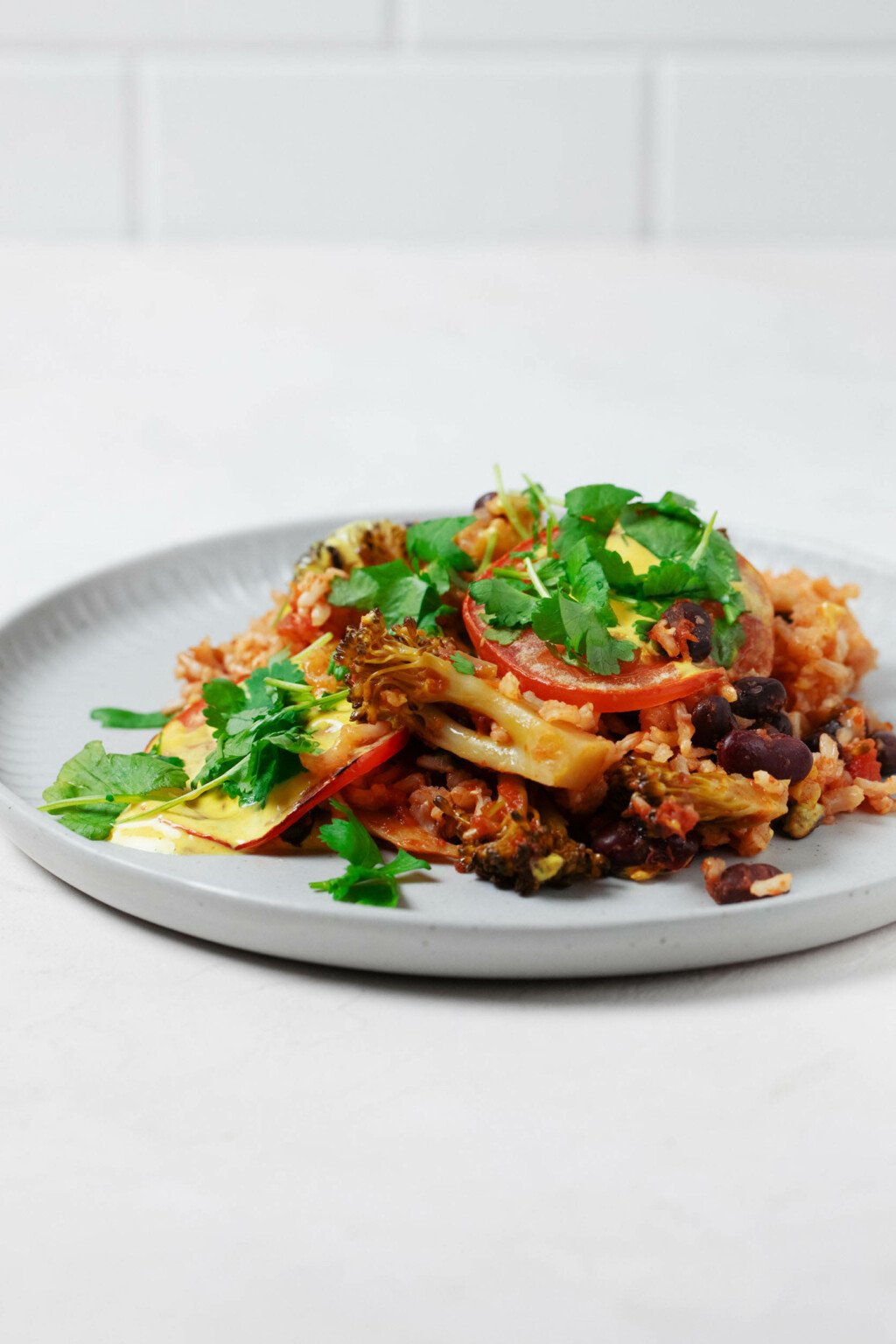
A beloved ingredient pair
I don’t really need to sing the praises of rice and beans. This ingredient duo is much beloved in recipes around the world, especially in the Americas and in Africa.
As is often the case with time-honored recipes or ingredient pairings, the combo of rice and beans is truly nourishing.
Together, rice and beans provide:
- Plant protein
- Fiber
- Iron
- B vitamins
- Magnesium
- Potassium
- Calcium* (this depends on the type bean)
- Phosphorus
- Vitamin E
A “complete” plant protein
You may have come across rice and beans being given as an example of a “complete” protein. What exactly does this mean?
I go into more depth in my post on protein-rich combinations of plant foods, but here’s the summary: proteins are built from different sequences of amino acids. In a sense, amino acids are the “building blocks” of protein.
When we eat protein, our digestive systems break down protein molecules, freeing amino acids for absorption. This happens largely in the jejunum of our small intestines.
We don’t only obtain amino acids from food. Rather, our bodies can produce many of the amino acids that we need for protein synthesis: for example, making peptide hormones or neurotransmitters.
However, there are nine other amino acids, called the “essential amino acids,” that we can’t produce endogenously. We have to obtain them from food.
A “complete protein” is a food source of protein that contains all of the nine essential amino acids.
Such proteins are sometimes called “high biological value,” or HBV, proteins. An LBV, or lower biological value protein, is one that’s missing one or more of the nine essential amino acids.
Animal proteins like meat, fish, whey, and eggs, are HBV proteins. So are certain plant proteins, such as quinoa, soy, or hemp hearts.
Other plant proteins are LBV proteins, which means that they contain some of the essential amino acids, but not all of them.
When I first became vegan, there was a lot of talk about the importance of putting complete plant proteins onto one’s plate.
Over time, nutrition education has shifted. Today we understand that a person who eats a variety of protein sources on a regular basis will ultimately obtain all of the essential amino acids. The body will then utilize these amino acids as needed.
In other words, you don’t have to stress about getting complete proteins with every meal. Instead, focus on getting enough protein overall and sourcing it from diversified foods: beans, tofu, tempeh, wheat, and so on.
Of course, when ingredients in a recipe can provide all of those essential amino acids, it’s an easy win. This brown rice casserole with broccoli and beans is such a recipe.
Speaking of beans, what type of beans should I use in the recipe?
When I make the brown rice casserole, I like to use a combination of black beans and kidney beans.
But this is just a suggestion. You can certainly substitute other types of beans for my choices. The casserole could be prepared with:
- Black-eyed peas
- Pinto beans
- White beans (cannellini or great northern)
- Chickpeas
- Adzuki beans
- Butter beans
Do I need to use brown rice?
No, you don’t. Brown rice is my suggestion for the casserole, but the recipe can be prepared with white rice, too.
Many of my nutrition clients ask me whether brown or white rice is better. My response is that a mix of both is fine. I routinely use both brown and white rice in my cooking.
From a health standpoint, brown rice contains the bran and the germ of the rice, so it has a bit more fiber and protein than white, as well as modestly higher micronutrient content.
It’s worth saying, though, that this difference in fiber is about three grams. That’s not nothing—the USDA’s fiber recommendation for adults is 25 grams for women and 38 grams for men—but it’s not a vast difference, either.
If you love white rice, choosing to enjoy it is not some sort of make-or-break nutrition issue. Especially if you get fiber from lots of other places in your diet, which many plant-based eaters do.
With all of that said, I happen to like the nuttiness of brown rice in this particular recipe.
I also like the texture of brown rice for a casserole: when I tested it with white rice, the rice tended to clump together, so it had a mushy effect.
You can substitute an equal amount of long-grain white rice for brown. If you do this, you’ll likely only need to give the casserole 30 minutes of time in the oven.
A wholesome set of toppings
A lot of casserole recipes call for melted cheese on top. I love the convenience of store-bought vegan cheese, but I also have a special love for homemade vegan cheeses.
I’ve made all sorts of vegan cheese recipes over the years. The one that I perfected first and still rely on most often is my go-to cashew cheese recipe.
But with cashews leading the way, I’ve expanded my options to include 10-minute vegan ricotta cheese, vegan yellow cheese sauce, melty vegan cashew mozzarella, cashew parmesan cheese, and versatile vegan cashew queso sauce.
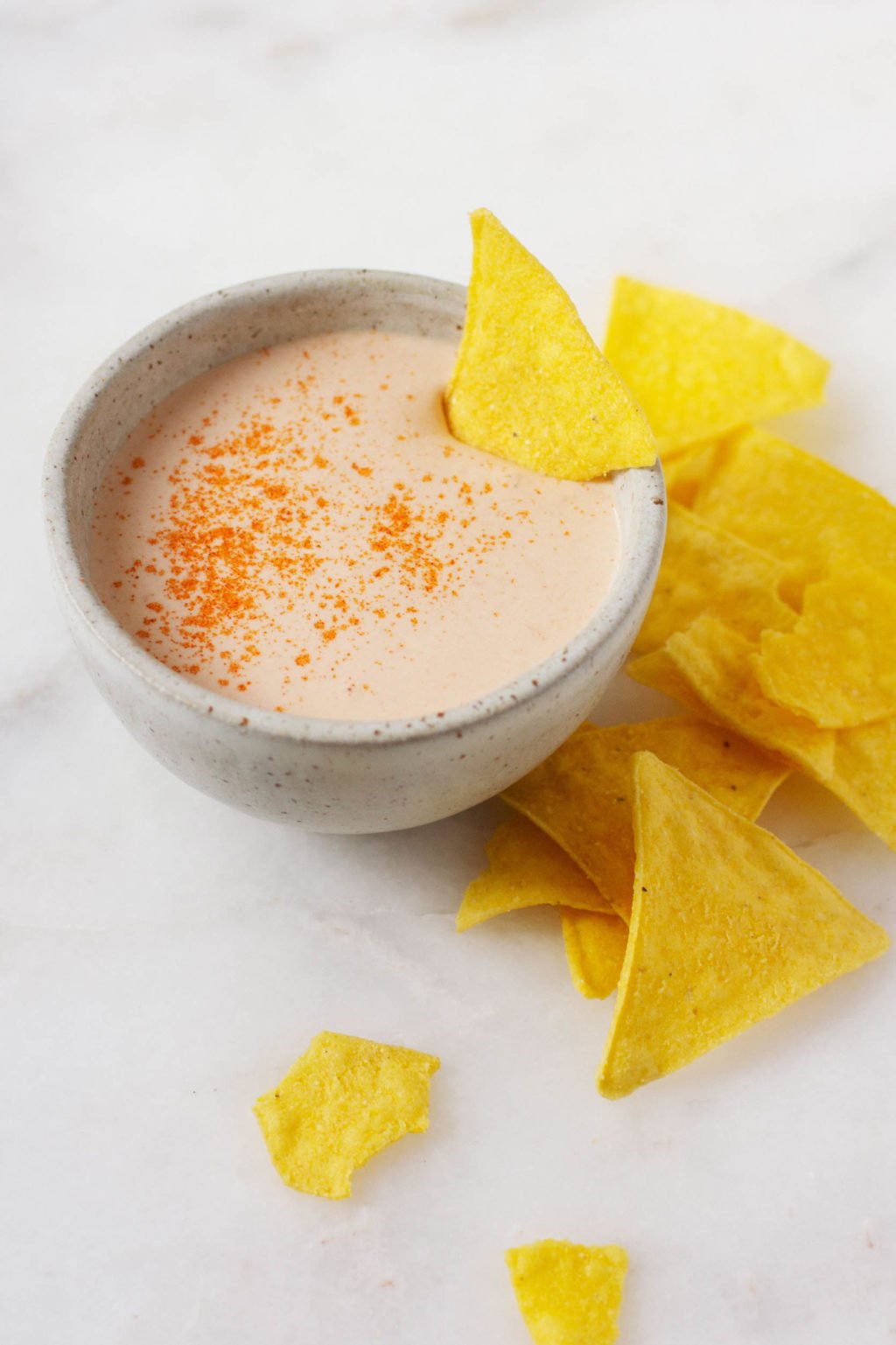
It’s the cashew queso that I use to top this casserole. It adds a creamy component to the recipe, some tangy and “cheesy” flavor (that’s thanks to lemon juice, tomato paste, and nutritional yeast), and a decorative component as well.
Since the top of the casserole begs for a little color, I also add broiled tomato slices, which you’ll read more about in the recipe steps and instructions.
I love using this method for lasagna and vegan pasta bakes as well as the brown rice casserole.
How to make brown rice casserole with broccoli and beans
Tired? Stressed? Going through a cooking rut?
The brown rice casserole is your recipe.
For one thing, you don’t really have to cook anything. Rather, you only have to dump ingredients into an oven-safe dish and allow the oven to take it away.
Also, there’s no sautéing of onion or garlic required before the casserole is transferred to the oven.
In order to incorporate alliums, I use a hack that I also rely on for the seasoned chickpeas in my chickpea burrito bowls: salsa.
Salsa, especially a roasted tomato salsa, contains onions that have already had their raw “bite” softened. Using a jar of roasted salsa in a recipe is like adding prepared onions, tomato, garlic, and other seasonings to your dish.
No chopping or sautéing required.
So, gather up your favorite, flavorful jar of salsa, two cans of beans that you have in the pantry, a bag of rice, and something green—and let’s get started.
Step 1: Preheat your oven
You’ll want to keep the oven temperature at 375°F / 190°C for this recipe.
Step 2: Place your ingredients into an oven-safe dish
No fancy moves required here. Just add the rice, beans, and salsa, along with a little avocado oil, a heap of broccoli florets, and some vegetable broth, into a 9 x 13-inch / 24 x 36cm baking dish.
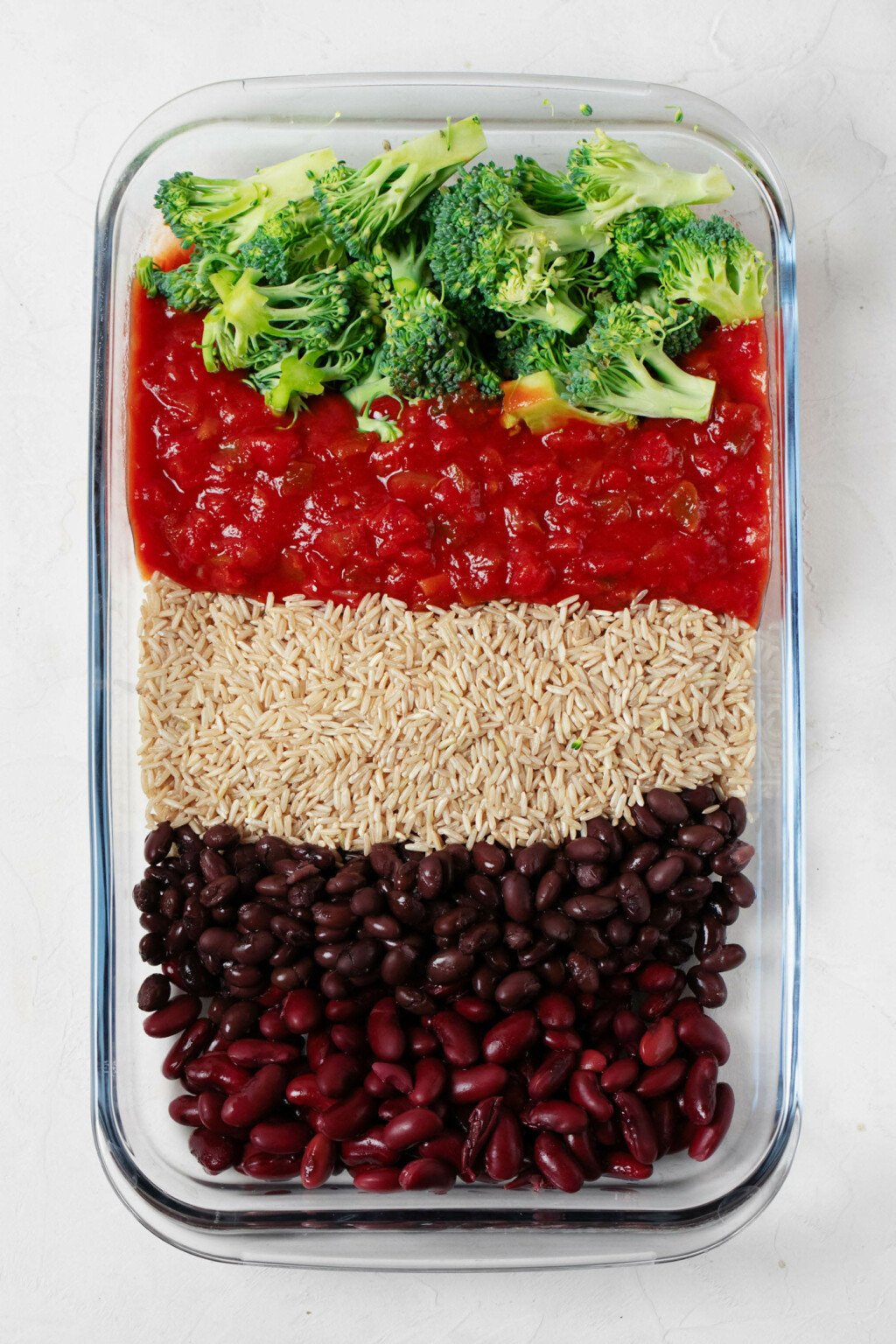
I use broccoli florets in this recipe because they’re probably my favorite vegetable, they’re easy to work with in fresh or frozen form, and they stand up well to baking. But you could use cauliflower florets, sliced zucchini, or cut pieces of green beans, too.
The avocado oil helps to keep the rice grains fluffy and distinct, as well as to carry flavors in the recipe.
Step 3: Bake
The brown rice casserole will need about one hour in the oven. After baking, the top ought to appear darkened. Tomato pieces and beans will both rice to the top during cooking.
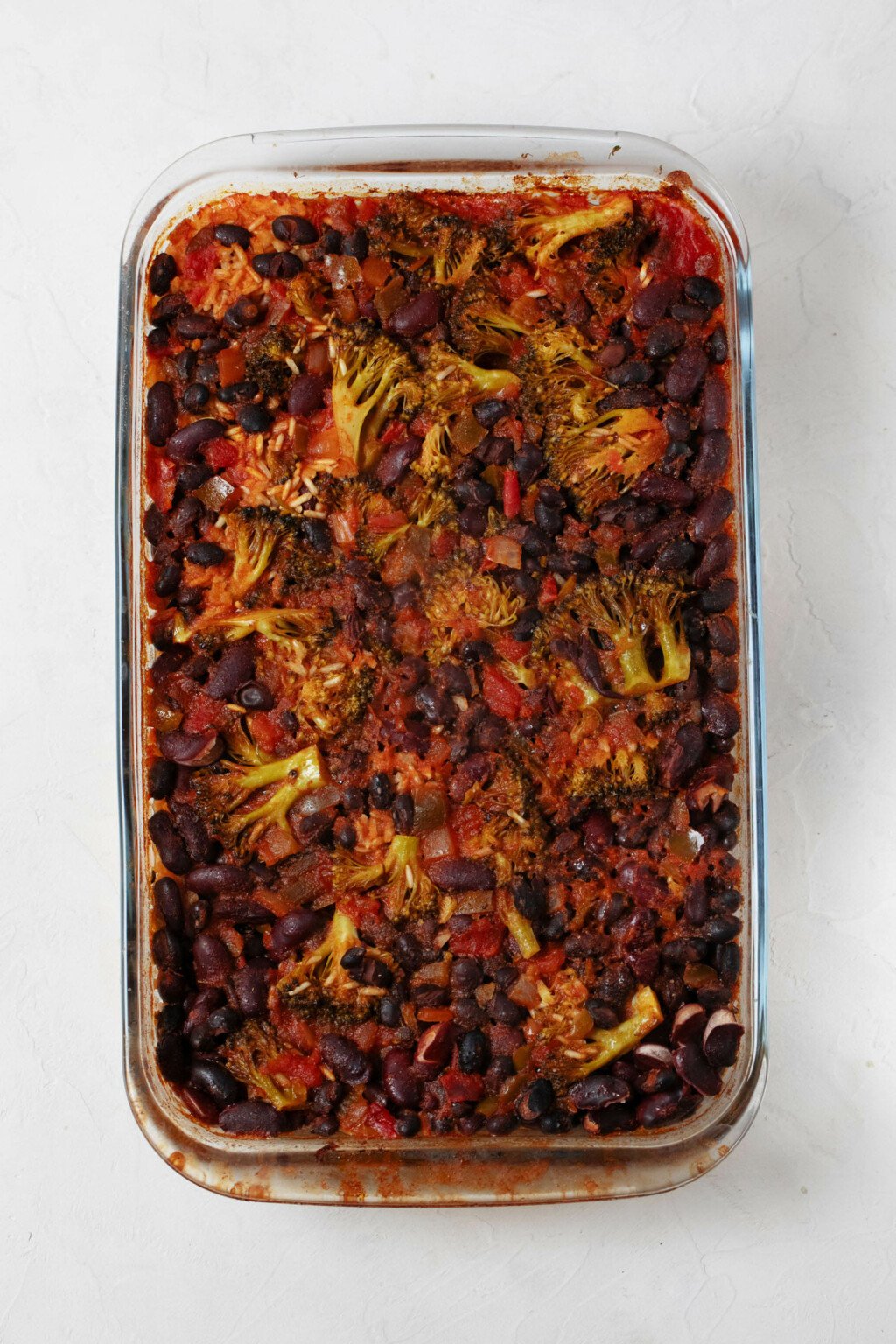
The rice should have absorbed all of the broth and be tender.
Step 4: Garnish (if you like)
At this point, you can give your earthy, not-especially-photogenic brown rice casserole a little extra adornment and love.
I do this by slicing a beefsteak tomato and layering those slices on top of the freshly baked casserole. Turn the oven to it’s broiler setting, on high.
Place the casserole under the broiler for 3-5 minutes, or until the tomatoes slices have shrunken a bit and appear softened, even a little browned in places.
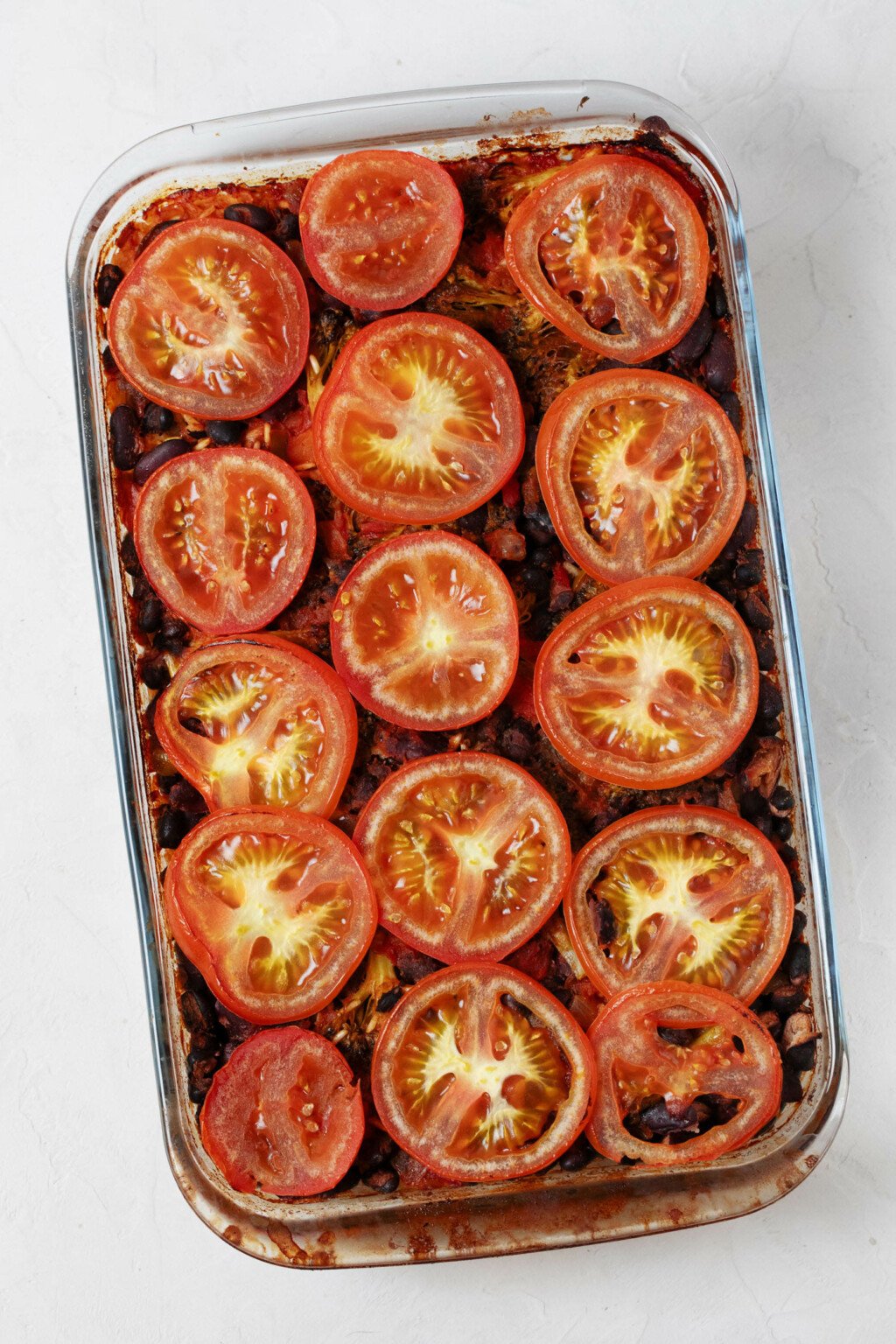
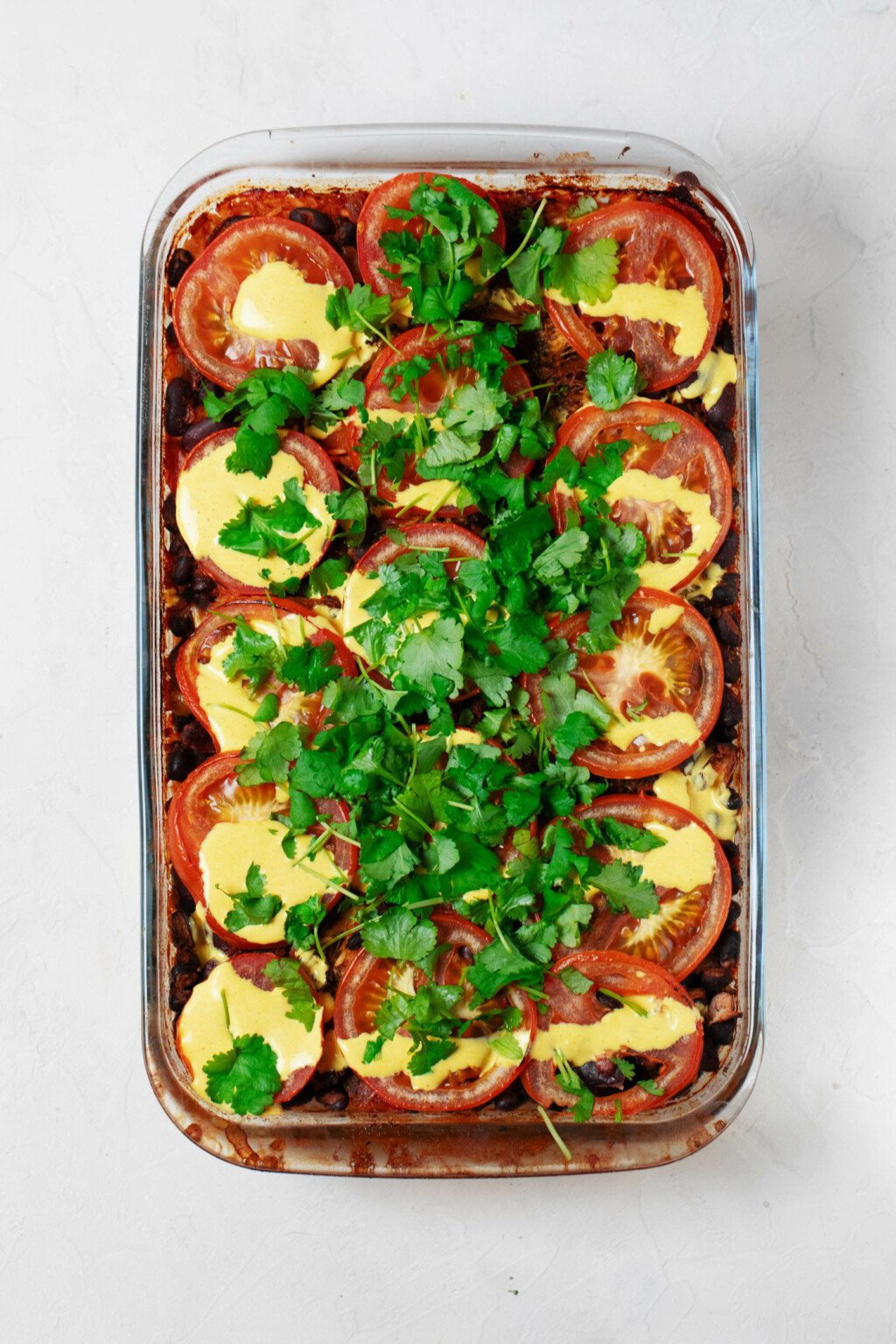
Then, drizzle your cashew queso sauce over the top of the casserole. I like to add a sprinkle of fresh, chopped cilantro after I do this for a pop of green.
If you don’t have time for any of these finishing touches, that’s OK. The baked rice and beans will still be nourishing and tasty.
Step 5: Serve or store (freezer options included)
At this point, you can cut the casserole into square slices and dig in. Serve them with your favorite side salad, slaw, or any other simple vegan vegetable side dish.
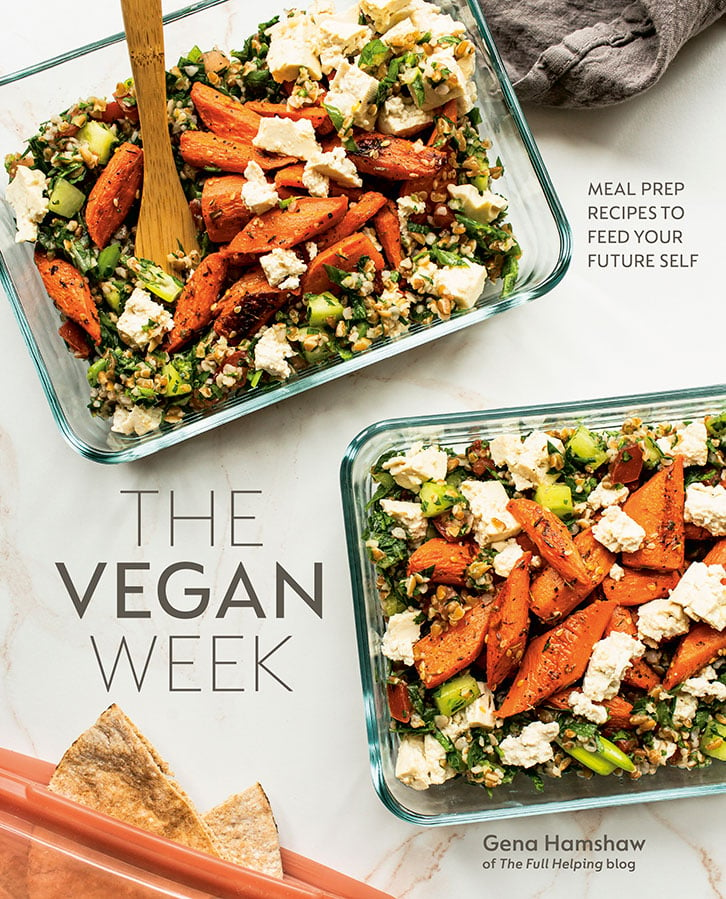
The Vegan Week
Embrace the joy of eating homemade food every day with the hearty and wholesome recipes in The Vegan Week.
Whether you have three, two, or even just one hour of time to spare, The Vegan Week will show you how to batch cook varied, colorful, and comforting dishes over the weekend.
The brown rice casserole is also an especially good option for vegan meal prep! The slices will keep well in an airtight container in your fridge for up to five days.
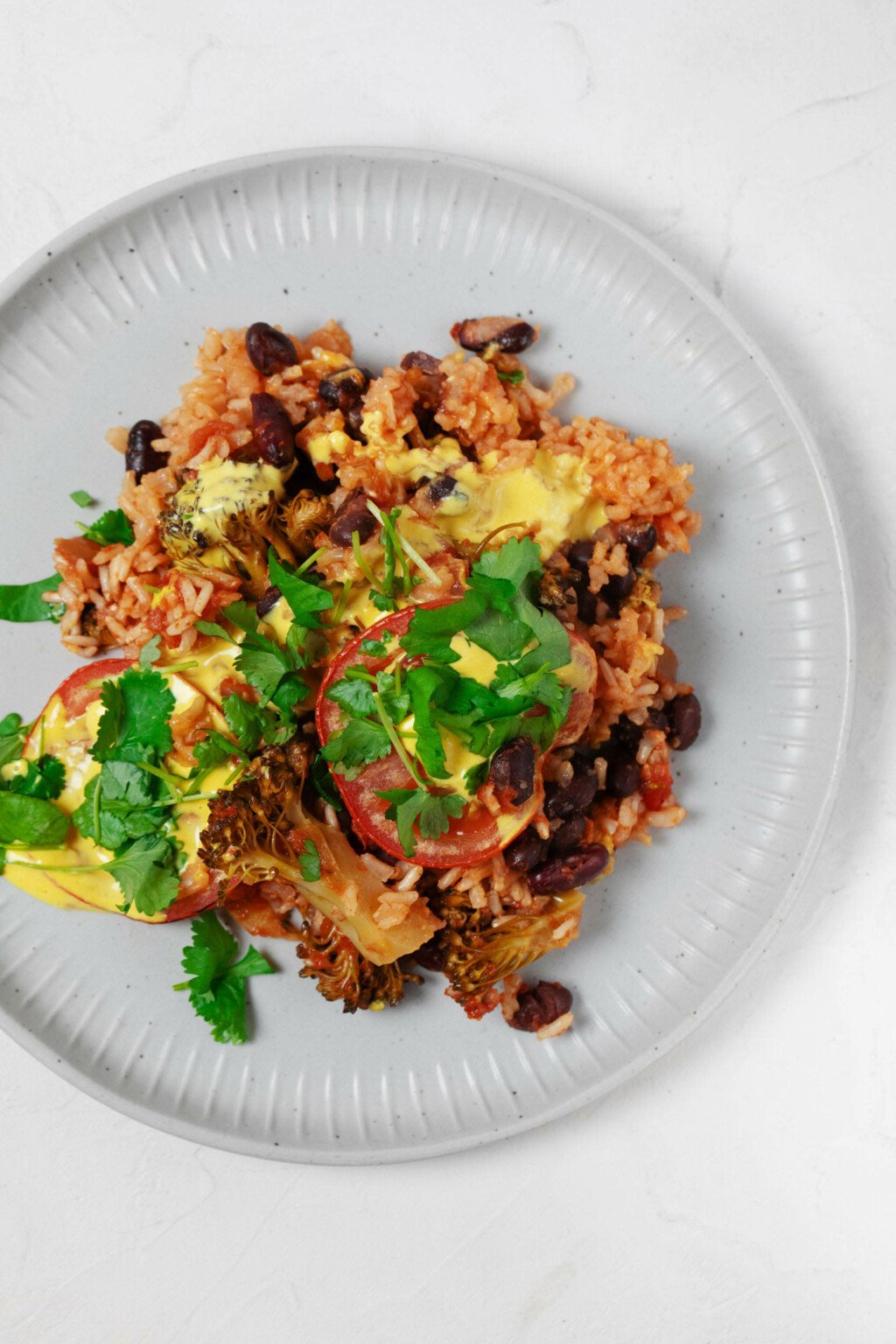
They can be frozen for up to six weeks and defrosted overnight in the fridge before serving.
More rice and bean dishes to savor
If you rely on the rice and bean combo as routinely as I do, I have a few ideas for you. Maybe they’ll inspire you to approach this time-honored pairing in a fresh way?
- Rice, beans, tofu and greens
- Coconut sweet potato rice and beans
- One-pot turmeric rice, beans and greens
- Rice & bean collard wraps
- Black bean and cilantro rice bowls
- Lemon dill zucchini and chickpea rice
And here’s my new favorite addition to that list.
It’s not the fanciest or most intricately seasoned casserole you’ll ever make, by any means. But it is something hearty and wholesome that you can make with almost no effort—and that’s a win in my book.
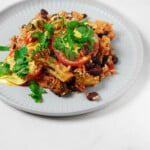
Vegan Brown Rice Casserole with Broccoli and Beans
Author –Ingredients
- 1 1/2 cups long-grain brown rice (270g)
- 1 1/2 cups cooked black beans (240g, or one 15-ounce / 425g can, drained)
- 1 1/2 cups cooked kidney beans (240g, or one 15-ounce / 425g can, drained)
- 16 ounces salsa of choice, preferably a roasted salsa (mild, medium, or spicy) (475ml)
- 1 1/2 tablespoons avocado oil
- 2 cups broccoli florets (or a mixture of florets and cuts) (200g)
- 1 teaspoon ground cumin
- 1/2 teaspoon sweet or smoked paprika (optional)
- 1/4-1/2 teaspoon garlic powder (adjust to taste)
- 2 1/4 cups vegan chicken-style or vegetable broth, at room temperature (530ml)
- 1 beefsteak tomato, cut crosswise into thin slices
- 1 batch cashew queso sauce (substitute a store-bought vegan cheese sauce or vegan cheese shreds)
- Chopped fresh parsley or cilantro leaves (optional, for garnish)
Instructions
- Preheat your oven to 375°F / 190°C.
- Place the rice, beans, salsa, avocado oil, broccoli florets, cumin, paprika if using, garlic powder, and broth into a 9 x 13-inch / 24 x 36cm baking dish. Stir well. Cover the baking dish tightly with foil. Transfer the dish to the oven and bake for 1 hour.
- Remove the baking dish from the oven. Set the broiler to high. Arrange the thin tomato slices in a layer on top of the baked rice and beans.
- Place the casserole under the broiler for 3-5 minutes, or until the tomatoes are a bit shrunken and appear cooked.
- Drizzle the casserole in a zigzag pattern with the cashew queso sauce. Finish topping it with fresh, chopped cilantro or parsley leaves. Cut the casserole into slices and serve with additional queso sauce tableside.
- The casserole will keep in an airtight container in the fridge for up to 6 days and can be frozen for up to 6 weeks.
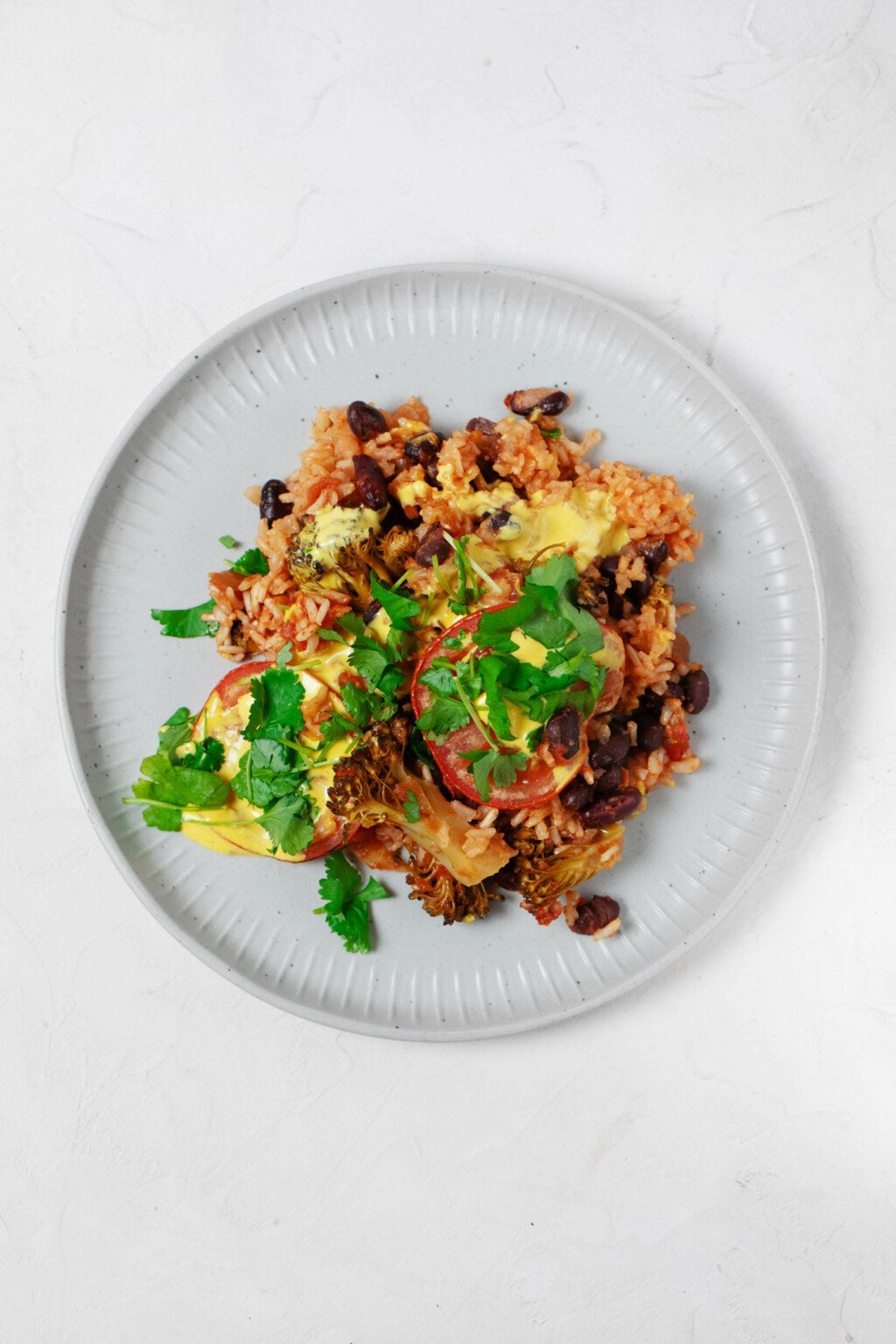
Look forward to hearing what you think about this low-stress formula, friends. It’s a good reason to double up on your favorite jar of salsa the next time you spot it at the store!
Have a great wrap-up to the week.
xo
This post may contain affiliate links. If you use these links to buy something I may earn a commission. Visit my privacy policy to learn more.
Method: Oven
Ingredients: Black Beans, Broccoli, Rice
Recipe Features: Meal Prep

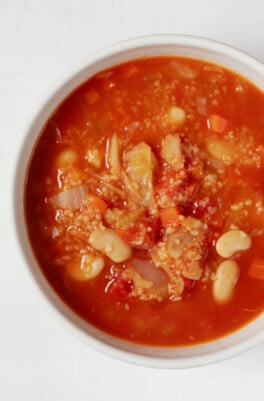
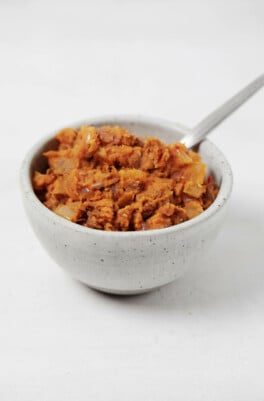
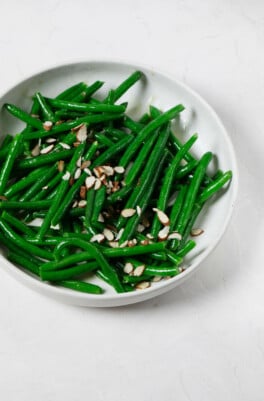
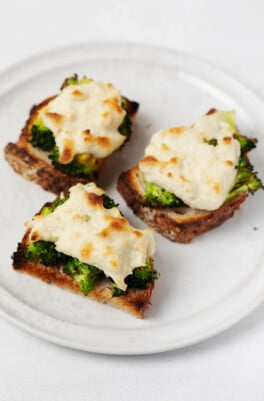
Leave a Comment
This dish is amazing – super simple and very tasty. It took 1 hour and 20 mins to cook the brown rice so next time I’ll soak the rice beforehand. And the cashew queso sauce linked in the recipe is so delicious – my kids devoured it!
So glad you like the recipe, Sarah!
Definitely looks like my kind of cooking! 2 questions: 1) crosswise means cutting through the equator of the tomato, yes? 2) rather than a flat dish covered with foil, can this be made in my Lodge Dutch oven and covered? I can’t wait to try this! Thanks!
Hi Suzy,
1) Yes
2) So long as it can hold the same amount of volume, I think it will work. Most 9 x 13 baking dishes are 3.5-4 quarts. I hope that it turns out well!
G